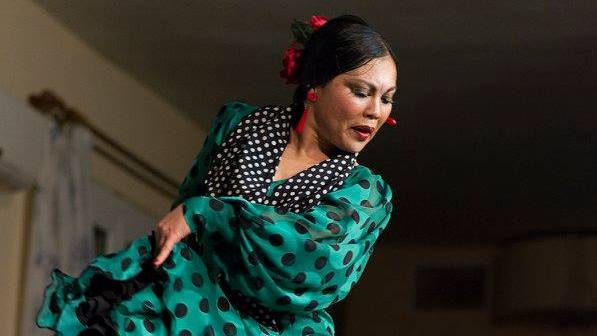The journey from her native city of Kawasaki in Japan to winning Spain’s most prestigious flamenco dancing prize took more than 20 years. But Junko Hagiwara, 48, has pulled off the feat, becoming the first foreigner to win the award — prompting both applause and outrage.
Known by her stage name of La Yunko, her victory last month at Spain’s leading flamenco festival — Cante de las Minas in La Unión in the southeastern region of Murcia — has rocked the traditional art form.
Hagiwara’s victory was not universally welcomed, despite her having lived in Seville for more than 20 years
ANTONIO PEREZ
Her triumph “provoked protests and jeers among the audience and a great stir on social networks … one can see a clear prejudice that sometimes borders on the racist”, noted El País. The newspaper added: “They seem to say that if you are not Andalusian, or at least Spanish, it is impossible to know flamenco, let alone dance well, and to have the nerve to win such an important prize as that of La Unión.”
Members of the audience and online critics claimed that the award was given to her as a ruse by the authorities in La Unión to “internationalise” the competition, which the organisers denied. “The other dancers were better. We had stood up to applaud them and we were very surprised when the jury chose La Yunko,” an audience member told La Vanguardia newspaper.
Hagiwara reacted with surprise to the level of attacks but pledged that she would carry on dancing. “I was expecting a little bit [of criticism], but not that much. I try not to read what they put online, but it gets to me. In any case, I have the strength to carry on,” she said. “I have been hurt by it but, on the other hand, I have received a lot of support and it makes me happy,” she told ABC newspaper. “As I now have the prize, I have to keep working and give more.”

Her decision twenty years ago to move to Spain and learn flamenco had angered her parents
ANTONIO PEREZ
Hagiwara has lived in Seville, the capital of the southern region of Andalusia, for more than 20 years. “When I was 14, I started learning rhythmic gymnastics and I came across the Spanish sportswoman Ana Bautista, who used the flamenco guitar in her exercises,” she said. “That was the first time I heard the word flamenco, which sparked my curiosity.”
Her decision to move to Spain to learn flamenco infuriated her parents. “My father got very, very angry. He did not speak to me for three months. And my mother said, ‘how shameful, how shameful’,” Hagiwara told the AFP news agency.
She has travelled across Spain dancing at flamenco venues and has come under the tutelage of famed teachers such as José Galván, El Torombo and Carmen Ledesma. “In Japan, you can learn technique, choreography, but, of course, flamenco is culture, it’s a way of life,” she said.

Hagiwara learnt from some of flamenco’s most famous teachers
CRISTINA QUICLER/AFP/GETTY IMAGES
She is also a dance teacher and has performed with the ballet of Yoko Komatsubara, the Japanese dancer and choreographer.
Hagiwara took to the stage of the “Cathedral of Flamenco” in the old public market of La Unión for the first time ten years ago, but then she did not even make the semi-finals. This time she won. “I had a lot of doubts, I didn’t know even if I should enter, because young people enter competitions and I’m of an age,” she said, adding the result was “unexpected”.
She defines her way of dancing as “sincere” and “spontaneous” and recognises that being Japanese has marked her way of performing, as “dance is a reflection of each person, and life experience”.
